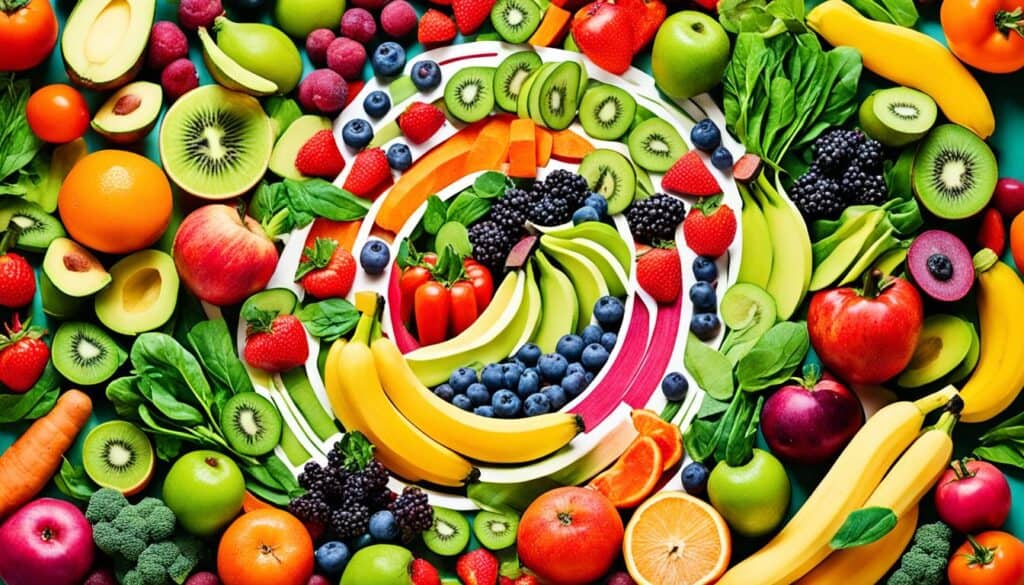Imagine this: you’re on the race track, heart pounding, adrenaline rushing through your veins. The crowd is cheering, urging you to go faster. You push your body to its limits, but deep down, you know there’s more in you. You ask yourself, “What foods make you run faster?”
You see, running is not just about the physical training, it’s about fueling your body with the right foods to maximize your performance. Whether you’re a seasoned marathoner or a casual jogger, incorporating power foods into your diet can make a significant difference in your running speed.
In this article, we will explore the top power foods that can help improve your running speed. These foods provide the necessary nutrients and energy to enhance your performance and help you reach your full potential as a runner.
Key Takeaways:
- Eating the right foods is essential for boosting your running speed.
- Power foods provide the necessary nutrients and energy for optimal performance.
- By incorporating these foods into your diet, you can reach your full potential as a runner.
- Consult with a professional nutritionist or dietitian to personalize your diet plan.
- Stay committed to your nutrition and training for optimal results.
what foods make you run faster
When it comes to improving running speed and stamina, proper nutrition plays a crucial role. The foods you consume directly impact your energy levels, endurance, and overall performance. By fueling your body with the right nutrients, you can optimize your running performance and achieve your goals.
Before we delve into specific foods, let’s explore the key nutrients that contribute to running speed and stamina:
- Carbohydrates: Carbohydrates are essential for providing the energy needed for running. They are the primary fuel source for muscles and help maintain glycogen stores, which are crucial for endurance. Opt for complex carbohydrates such as whole grains, fruits, and vegetables.
- Protein: Protein is vital for muscle repair and recovery. It supports muscle strength and aids in faster recovery after intense training sessions. Include lean sources of protein such as poultry, fish, legumes, and dairy products.
- Healthy Fats: While fats often get a bad rap, healthy fats are essential for long-lasting energy and endurance. They provide essential fatty acids that support overall health and help sustain energy during long-distance runs. Incorporate foods like avocados, nuts, seeds, and fatty fish.
- Micronutrients: Vitamins and minerals are essential for optimal performance and recovery. They help regulate bodily functions and protect against exercise-induced stress. Ensure you consume a variety of fruits, vegetables, and whole foods to get a wide range of micronutrients.
- Hydration: Adequate hydration is vital for maintaining optimal performance. Water and electrolytes play a significant role in regulating body temperature, preventing dehydration, and supporting muscle function. Drink enough water throughout the day and consider adding electrolyte-rich beverages like coconut water to replenish electrolyte levels.
By incorporating these key nutrients into your diet, you can improve your running speed, increase stamina, and enhance overall performance. However, it’s important to note that individual nutritional needs may vary based on factors such as body weight, training intensity, and personal preferences.
Remember to consult with a professional nutritionist or dietitian to create a personalized running performance diet plan that aligns with your specific needs and training program. With the right nutrition, you can maximize your running potential and achieve your desired results.
| Category | Foods |
|---|---|
| Carbohydrates | Whole grains, fruits, vegetables |
| Protein | Poultry, fish, legumes, dairy products |
| Healthy Fats | Avocados, nuts, seeds, fatty fish |
| Micronutrients | Fruits, vegetables, whole foods |
| Hydration | Water, coconut water |
Carbohydrates – The Fuel for Performance
When it comes to fueling your running performance, carbohydrates are an essential component. As the primary source of energy for runners, consuming the right carbohydrate-rich foods can provide the sustained energy you need to enhance your running speed and improve overall performance.
Carbohydrates are broken down into glucose, which is stored in the form of glycogen in your muscles and liver. During exercise, glycogen is converted back into glucose to fuel your muscles and keep you going. By optimizing your glycogen stores, you can improve both your endurance and running speed.
Here are some of the best energy-boosting foods for runners that are rich in carbohydrates:
- Whole grains: Foods like whole wheat bread, oats, quinoa, and brown rice provide complex carbohydrates that release energy slowly, ensuring a steady supply for longer runs.
- Fruits: Bananas, oranges, apples, and berries are not only packed with vitamins, minerals, and antioxidants but also provide a quick and easily digestible source of carbohydrates.
- Legumes: Lentils, chickpeas, and black beans are not only rich in carbohydrates but also contain a good amount of protein, making them a valuable option for runners.
- Potatoes: Whether it’s white potatoes or sweet potatoes, both are excellent sources of carbohydrates, providing fuel for your runs.
- Energy gels: Designed specifically for endurance athletes, energy gels are a portable and convenient source of carbohydrates that can be consumed during long runs or races.
So, make sure to include these energy-boosting foods in your diet to optimize your running performance.
Hillary’s Tip:
“Incorporating a variety of carbohydrate-rich foods into your pre- and post-run meals can help ensure that your glycogen stores are optimized, allowing you to perform at your best.”
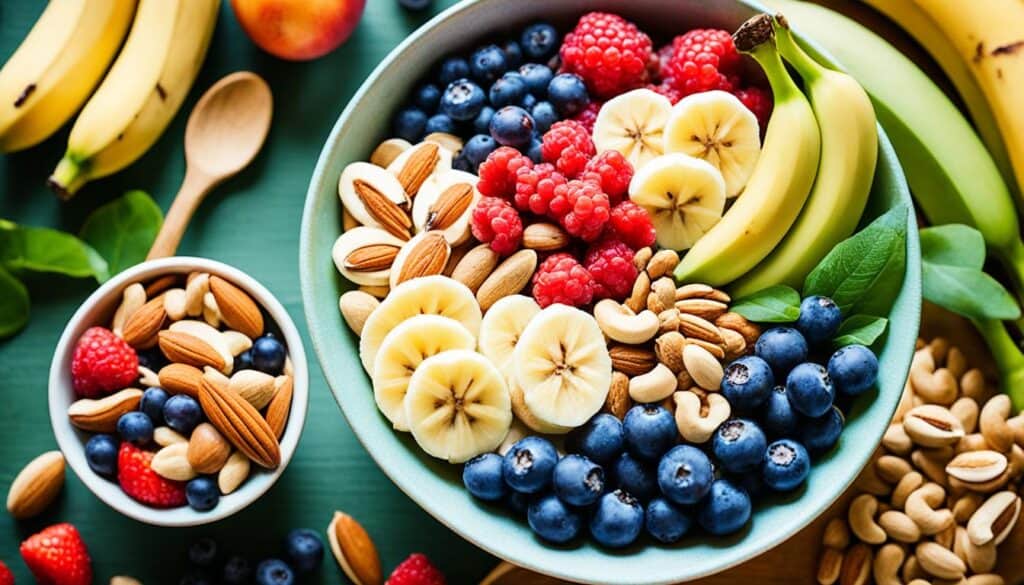
| Carbohydrate-Rich Foods | Benefits |
|---|---|
| Whole grains | Provide sustained energy release |
| Fruits | Quick and easily digestible source of carbohydrates |
| Legumes | Rich in carbohydrates and protein |
| Potatoes | Excellent source of fuel for runs |
| Energy gels | Portable and convenient source of carbohydrates |
Protein for Muscle Repair and Recovery
Protein plays a crucial role in the muscle repair and recovery process for runners. When you engage in high-intensity workouts, your muscles experience microtears that need to be repaired to support growth and development. Including protein-rich foods in your diet can enhance muscle strength, aid in faster recovery, and ultimately improve your running speed.
Here are some protein-packed foods that runners should incorporate into their diet:
- Chicken breast: A lean source of protein that is low in fat and high in amino acids necessary for muscle repair and growth.
- Salmon: Rich in omega-3 fatty acids and high-quality protein, salmon promotes muscle recovery and reduces inflammation.
- Greek yogurt: Packed with protein and probiotics, Greek yogurt aids in muscle repair and supports gut health.
- Quinoa: A complete protein source that contains all essential amino acids, quinoa aids in muscle repair and provides sustained energy.
- Eggs: A versatile protein source that is easily digestible and contains all nine essential amino acids.
Additionally, plant-based protein sources such as tofu, lentils, and chickpeas are excellent options for vegetarian or vegan runners.
“Protein is an essential nutrient for runners, as it helps in muscle repair and recovery. Including protein-rich foods in your diet can significantly improve your running speed.”
It is important to note that protein intake should be balanced with other nutrients to optimize overall performance. Consult with a nutritionist or dietitian to determine the recommended protein intake based on your individual needs and training goals.
TIP: Protein Timing
Consuming protein within the first 30 minutes after a run or workout can enhance the muscle repair and recovery process. Pairing protein with carbohydrates in this post-workout window can further facilitate glycogen replenishment and muscle protein synthesis.
Healthy Fats for Endurance
Despite the common association between fats and weight gain, incorporating healthy fats into your diet can actually enhance your endurance and improve running speed. By consuming foods rich in essential fatty acids, you can provide your body with the fuel it needs for long-lasting energy during your runs.
One excellent source of healthy fats for runners is avocados. Avocados are not only delicious, but they also contain monounsaturated fats that can help reduce inflammation and support cardiovascular health. Additionally, they are packed with vitamins and minerals that contribute to overall well-being.
Another fantastic option is nuts and seeds. These small powerhouses are high in omega-3 fatty acids, which have been shown to improve lung function and reduce exercise-induced asthma symptoms. Walnuts, chia seeds, and flaxseeds are particularly rich in these beneficial fats.
Let’s not forget about fatty fish like salmon and sardines. These types of fish are loaded with omega-3 fatty acids that promote heart health and reduce muscle inflammation. Including them in your diet can help enhance your endurance and accelerate post-run recovery.
“Incorporating healthy fats into your diet can provide the sustained energy needed for long-distance running.” – Dr. Jane Turner, Sports Nutritionist
It’s important to note that while healthy fats are beneficial, moderation is key. These foods are calorie-dense, so be mindful of portion sizes to maintain a balanced diet.
The Benefits of Healthy Fats for Runners:
- Provide sustained energy for long-distance running
- Support heart health and reduce inflammation
- Promote lung function and reduce exercise-induced asthma symptoms
- Aid in post-run recovery and muscle repair
Foods Rich in Healthy Fats for Endurance
| Food | Healthy Fat Content |
|---|---|
| Avocado | 15g per avocado |
| Walnuts | 13g per ounce |
| Chia Seeds | 9g per ounce |
| Flaxseeds | 6g per tablespoon |
| Salmon | 13g per 4 ounces |
| Sardines | 14g per 3 ounces |
Incorporating these healthy fats into your diet can provide the necessary endurance to push through long runs and improve your overall running speed. Remember to balance your fat intake with other essential nutrients and consult with a nutritionist to personalize your diet plan according to your specific needs and goals.
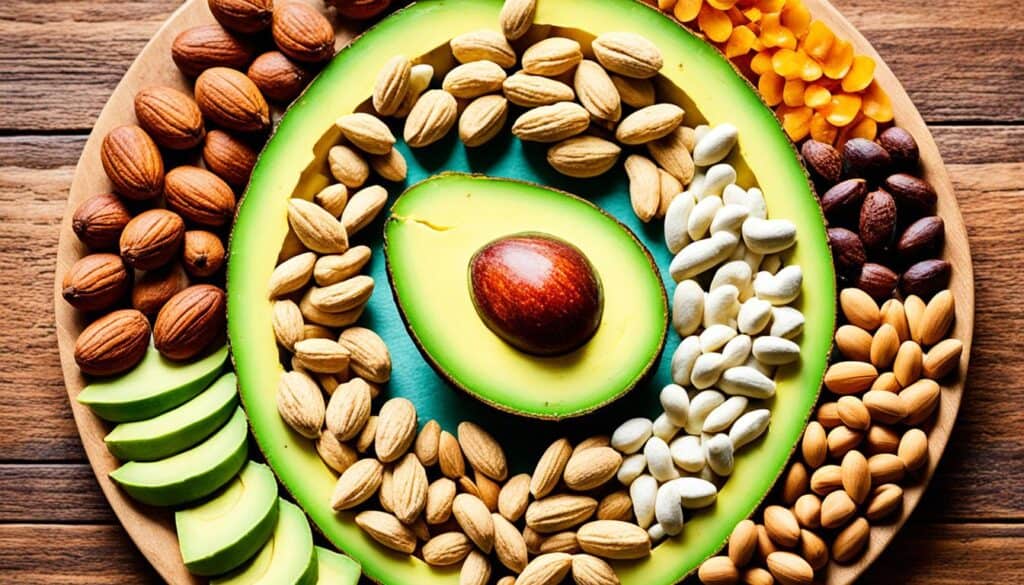
Micronutrients and Antioxidants for Performance
Proper intake of micronutrients and antioxidants is vital for optimal performance and recovery. These essential nutrients support various physiological functions in the body, helping to enhance running speed and combat exercise-induced stress. Incorporating foods rich in vitamins, minerals, and antioxidants into your diet can provide the necessary support for your running journey.
Vitamins and minerals are micronutrients that play crucial roles in energy production, muscle function, and immune system health. They aid in the efficient breakdown of carbohydrates, proteins, and fats, ensuring a steady supply of energy during workouts. Moreover, vitamins and minerals contribute to the repair and maintenance of tissues, reducing the risk of injuries and promoting faster recovery.
Antioxidants are compounds that protect the body’s cells from oxidative stress, which can be intensified during rigorous exercise. They neutralize harmful free radicals generated during physical activity, preventing damage to cells and tissues. By reducing oxidative stress, antioxidants contribute to better overall performance, faster recovery, and enhanced running speed.
Here are some key micronutrients and antioxidants that runners should incorporate into their diets:
Vitamin C
Vitamin C is a powerful antioxidant that supports immune function, collagen synthesis, and iron absorption. It aids in the formation of collagen, a protein that provides structure to tendons, ligaments, and blood vessels. Sources of vitamin C include citrus fruits, berries, kiwi, bell peppers, and leafy green vegetables.
Vitamin E
Vitamin E is an antioxidant that protects cell membranes from oxidative damage. It helps in maintaining healthy red blood cells and supports cardiovascular health. Good sources of vitamin E include nuts and seeds, spinach, broccoli, and avocado.
B vitamins
B vitamins, including B1 (thiamine), B2 (riboflavin), B3 (niacin), B5 (pantothenic acid), B6, B7 (biotin), B9 (folate), and B12, are crucial for energy production, nerve function, and red blood cell formation. They help convert carbohydrates into usable energy and aid in the metabolism of proteins and fats. B vitamins are found in whole grains, legumes, leafy green vegetables, poultry, fish, and eggs.
Zinc
Zinc is a mineral that supports immune function, protein synthesis, and wound healing. It plays a role in maintaining a healthy metabolism and helps with muscle repair and recovery. Excellent sources of zinc include lean meats, seafood, whole grains, nuts, and seeds.
Remember to include a variety of fruits, vegetables, whole grains, lean proteins, and healthy fats in your diet to ensure you are getting an adequate intake of these micronutrients and antioxidants. Consult with a registered dietitian or nutritionist to create a balanced meal plan tailored to your specific needs and preferences.
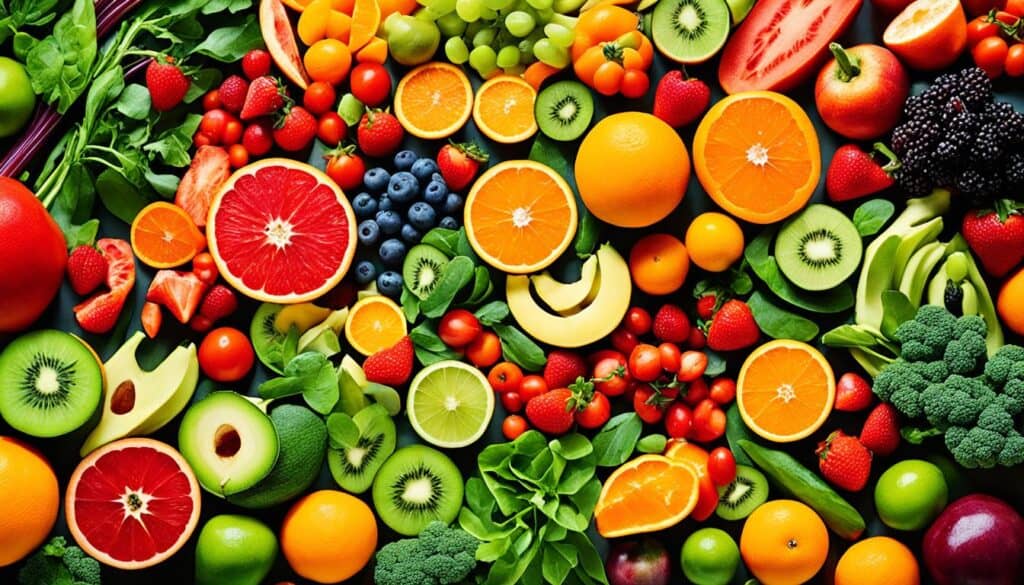
| Micronutrient/Antioxidant | Food Sources |
|---|---|
| Vitamin C | Citrus fruits, berries, kiwi, bell peppers, leafy green vegetables |
| Vitamin E | Nuts and seeds, spinach, broccoli, avocado |
| B vitamins | Whole grains, legumes, leafy green vegetables, poultry, fish, eggs |
| Zinc | Lean meats, seafood, whole grains, nuts, seeds |
Hydration and Electrolytes for Performance
Hydration and electrolyte balance play a crucial role in improving running speed and overall performance. As a runner, it’s essential to replenish fluids and electrolytes that are lost through sweat to maintain optimal hydration levels. Dehydration can lead to fatigue, muscle cramps, and decreased performance.
To stay adequately hydrated during training sessions and race days, consider incorporating the following foods and drinks into your diet:
- Water: The simplest and most essential form of hydration. Drink water before, during, and after your runs to maintain proper fluid balance in the body.
- Sports drinks: These drinks contain a combination of carbohydrates and electrolytes, providing both hydration and energy. Opt for natural or homemade sports drinks to avoid excessive sugar and artificial additives.
- Coconut water: A natural source of electrolytes like potassium and magnesium, coconut water is a refreshing and hydrating option.
- Water-rich fruits and vegetables: Foods like watermelon, cucumber, oranges, and strawberries are not only hydrating but also provide vitamins and minerals that support overall health and performance.
In addition to these foods and drinks, it’s crucial to listen to your body’s hydration needs. Pay attention to thirst cues and monitor the color of your urine, aiming for a pale yellow or straw-colored appearance.
The key to optimal performance is maintaining a well-hydrated body. By incorporating these hydration-enhancing foods and drinks into your diet, you can significantly improve your running speed and endurance.
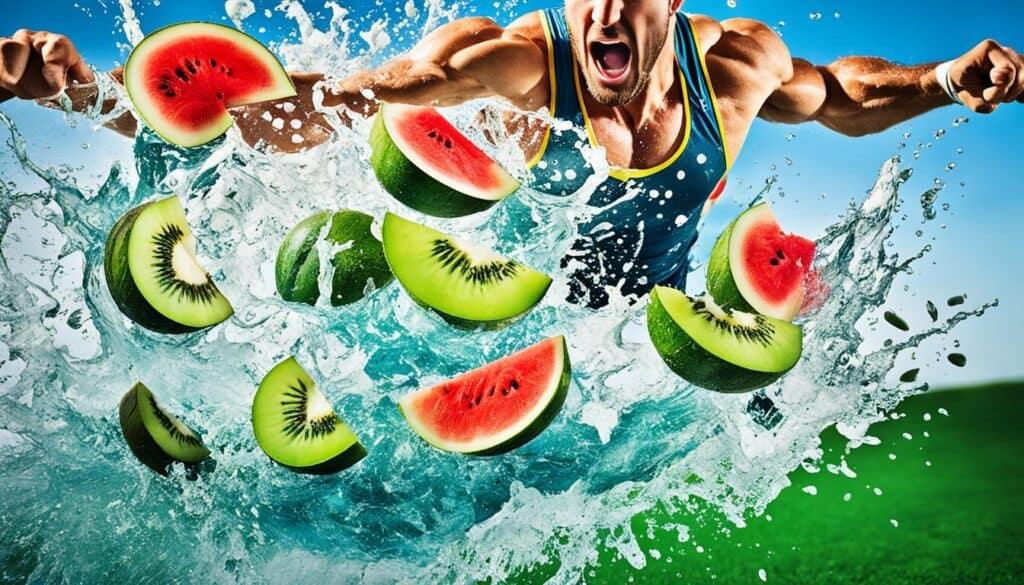
The Importance of Electrolytes
Electrolytes are minerals that carry an electric charge in the body and are essential for muscle function, nerve conduction, and fluid balance. Sodium, potassium, magnesium, and calcium are examples of electrolytes that need to be replenished during exercise.
During prolonged or intense running sessions, you can lose electrolytes through sweat. It’s important to replace these electrolytes to maintain proper muscle function and prevent cramping or fatigue. Here are some foods rich in electrolytes:
| Electrolyte | Food Sources |
|---|---|
| Sodium | Table salt, pickles, olives, broth |
| Potassium | Bananas, oranges, potatoes, avocados |
| Magnesium | Spinach, almonds, pumpkin seeds, dark chocolate |
| Calcium | Dairy products, fortified plant-based milk, leafy green vegetables |
By incorporating these hydration and electrolyte-rich foods into your diet, you can maintain optimal hydration levels and support your running performance. Remember to consult with a professional nutritionist or dietitian for personalized hydration and nutrition advice based on your specific needs.
Conclusion
In conclusion, incorporating specific power foods into your diet can significantly improve your running speed. By fueling your body with the right nutrients, you can optimize your performance and achieve your running goals.
For faster running, focus on a diet that includes foods rich in carbohydrates, such as whole grains, fruits, and vegetables. These foods provide the necessary energy to sustain your workout and enhance your running speed.
Additionally, prioritize protein-rich foods like lean meats, poultry, fish, and legumes to support muscle repair and recovery. Adequate protein intake aids in faster recovery and ultimately improves running speed.
Don’t overlook the importance of healthy fats, found in foods like avocados, nuts, and olive oil, which provide essential fatty acids for endurance and long-lasting energy. These fats can help you maintain a steady pace and improve your overall running speed.
Remember to consult with a professional nutritionist or dietitian to personalize your diet plan based on your specific needs and training program. Stay committed to your nutrition and training, and you’ll soon experience the results on the track or during your marathon.
FAQ
What are some power foods that can help improve my running speed?
How does proper nutrition contribute to running faster?
Which carbohydrate-rich foods can enhance my running speed?
How does protein help improve running speed?
Are there any healthy fats that can improve endurance and running speed?
How do micronutrients and antioxidants contribute to running speed?
What role does hydration and electrolyte balance play in running speed?
How do I incorporate these power foods into my daily diet?
To learn more about food and nutrition for runners. Click HERE

